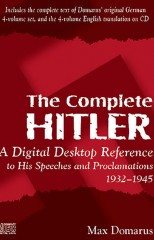
Author : Hitler Adolf - Domarus Max
Title : Hitler Speeches and Proclamations Volume 1, 2, 3 and 4 The Complete Hitler A digital desktop reference to his speeches and proclamations 1932-1945
Year : 1945
Link download : Hitler_Adolf_-_Hitler_Speeches_and_Proclamations.zip
THE YEAR 1932 Major Events in Summary The year 1932 marked the climax of Hitler’s domestic struggle. To a certain extent, the events of these twelve months reflect the entire course of his endeavors to gain control of German government since 1919. Thus the year 1932 as mirrored in this work is an accurately drawn miniature of the fourteen years of struggle for power which preceded it. There were three alternative paths which could lead Hitler to the power he so coveted. The first possibility was a violent coup, which would, in all probability, necessitate bloodshed and an open confrontation with the armed forces of the Reichswehr and the police— a path which Hitler was hesitant to take now and had attempted to avoid at his putsch in November 1923. Nevertheless, he kept this possibility in mind as a last resort and had made certain preparations for it during this major year of struggle, 1932. The second path was that of legal accession to power by means of a plebiscite, i.e. by achieving an absolute majority or a “right-wing majority” in the Reichstag and the Landtage (State Diets) or else with the election of a National Socialist Reich President. Under normal circumstances, the Weimar Constitution provided for the latter only every seven years. In both cases—either a right-wing majority in the Reichstag or the election of a National Socialist Reich President—nothing could have prevented the legal constitution of a cabinet chosen by Hitler. The year 1932, given Hitler’s rhetorical prowess, appeared to fulfill all of the prerequisites for this solution: domestic chaos had reached a peak due to the worldwide economic crisis; six million unemployed were demanding work and bread. The Mittelstand, the civil servants, and the peasants were less than satisfied with the German Government. The Reich President and the Reich Chancellor had been governing since 1930 with what amounted to dictatorial powers by virtue of Article 48 of the Weimar Constitution and had nevertheless been unable to alleviate the economic oppression. No less than fifteen election campaigns in 1932 (two presidential elections, two Reichstag elections, nine Landtag elections, and two local elections) were dominated by Hitler’s demagogical talents, which were sans pareil at the time. He was nonetheless able to score only partial successes in relatively small Länder. In the more decisive elections, the requisite 50% of the votes cast eluded his grasp despite his tireless efforts and unrivaled oratorical campaigns. The third path to power led, in the current figure of speech, through the “back door.” It was essential to exert sufficient influence on both the private and public counsellors of the Reich President in the circles of the aristocracy, the Reichswehr, and the economy to such an extent that they would, in turn, attempt to sway the Reich President to institute a presidential cabinet under Hitler composed of ministers enjoying his personal confidence. This path, which ultimately took Hitler to his goal, also gave him ample opportunity to make use of his powers of oral persuasion. He who had long been the butt of ridicule as a small-time party leader and failed putschist had become socially acceptable by 1932. The Reich President received him several times. Ministers in and out of office, leaders of industry, former generals, and active officers of the Reichswehr met to confer with him; party leaders from the German Nationalists to the Center made appointments to see him. Some were attempting to consolidate their forces with his; others to pacify him with insignificant ministerial posts. As the “drummer” of the national uprising, he had served their purpose well; now they wanted to exercise the power he had gained. But Hitler outplayed them all. Under the very eyes of the Government, he had established a “state within a state” with his National Socialist Party and now declared publicly that he and the NSDAP were the true representatives of Germany, and not the existing Reich Government. His Reichsleiters and Gauleiters conducted themselves as though they were Reich Ministers and District Presidents. Countless party “offices” (Agrarian Policy Office, Army Policy Office, Labor Service Office, etc.) made public statements on the events of the day and interfered with genuine “official” matters. Hitler dispatched his own observer—former General Franz Ritter von Epp—to the Disarmament Conference in Geneva. In 1932 he issued a proclamation to the German peasants admonishing them to finish harvesting their crops in good time. The “Reich Press Chief’ of the NSDAP conducted press conferences as though he were the press chief of the Reich Government. Uniformed men of the SS, the Schutzstaffel, assumed the task of erecting roadblocks at mass meetings and rallies as though they were the regular police. Tens and even hundreds of thousands of SA men in uniform made spectacular performances of marching and parading in the former German garrison towns. Their formations were numbered after the former imperial army troops. When Hitler later acceded to power, he did not hesitate to appoint his party friends to the same positions in State which they had held within the Party, with the exception of the SA, as would become dramatically evident in 1934. When attending negotiations in Berlin in 1932, Hitler resided at the Kaiserhof Hotel across the street from the Chancellory. He intended that those in power there see that he was really standing “ante portas” and hear the cries of the many thousands from the Wilhelmsplatz demanding Hitler’s Machtergreifung. Asked by a journalist whether one might indeed witness a march on Berlin á la Mussolini, Hitler replied: “Why should I march on Berlin? I’m already there!” In reality, Hitler was not as certain of victory as he pretended to be. He knew very well that, were he not successful in exploiting the extraordinary circumstances of the year 1932 (i.e. the economic and political crises and the presidential and parliamentary elections), his accession to power would become a thing of the distant future. By the end of 1932, the worst of the world economic crisis had passed, the unemployment rates had already begun to decline, and there were endeavors in Lausanne and Geneva to close the chapter on the Treaty of Versailles and the reparations. To some of Hitler’s voters, the struggle for power had already taken too long: they would no longer cast their ballots for him. Party leaders here and there began to lose heart and became restless. Hitler declared at that time: “If the Party ever falls apart, I will take a gun and end it all in a minute.” But Hitler mastered these crises. His talent for oratory and his persistence won out. In the end he was able to persuade not only his vacillating party comrades but also those in power at the time—above all Papen and Hindenburg—that he alone was able to lead Germany onwards to an age of new greatness. The triumph Hitler achieved over his domestic opponents in 1932 continued to affect him throughout his lifetime. He believed himself capable of attaining his foreign-policy goals by using the same methods and expected that the outcome of this second struggle would not deviate “by a hair’s breadth” from the first. ...

Palmer Michael - Hiroshima revidiert
Author : Palmer Michael Title : Hiroshima revidiert Die beweise für napalm und senfgas anstatt...














